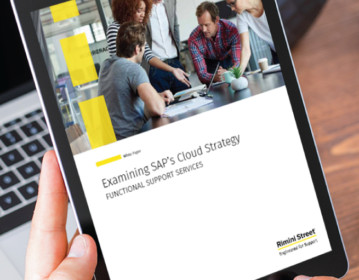
Examining SAP’s Cloud Strategy
The market for ERP and enterprise applications in general is undergoing seismic shifts, thanks to the cloud. That leaves IT leaders scrambling to update their technology roadmaps – and avoid detouring down dark alleys. SAP has published a great deal of information about the cloud and how it relates to S/4HANA, but there are still gaps between the vision and what SAP has delivered so far. In this paper, we examine SAP’s cloud strategy versus SAP’s cloud reality.
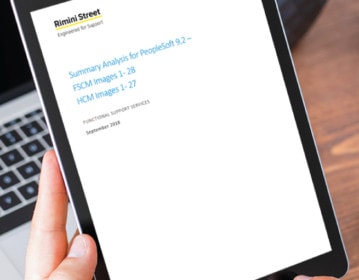
Unpacking the HCM and FIN PUM Images for PeopleSoft 9.2
The Functional Support Services (FSS) organization within Rimini Street analyzed all of the updates Oracle Corporation incorporated into the PeopleSoft 9.2 HCM images 1 -27 and FSCM images 1 -28, which is included in this technical white paper. We undertook this analysis to provide our clients more clarity and transparency as to the true value and benefits they can expect in their functionality upgrade roadmap.
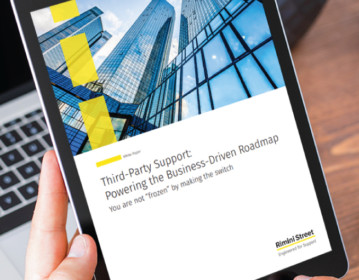
Third-Party Support: Powering the Business-Driven Roadmap – You Are Not “Frozen” by Making the Switch
Some ERP customers who are considering a move to Rimini Street for third-party support voice a concern that their ERP solution will be frozen. Yet, change is inevitable. Areas that we see ERP customers continue to change include updates to the core ERP solution (aka upgrades), extensions, modernization and innovation (often including cloud initiatives). Rimini Street is an enabler of change and helps enterprises grow and gain competitive advantage. Rimini Street clients continue to grow and evolve their ERP portfolios, including modernization of their technology stacks and investment in innovations such as cloud-based applications and tools. We can help make similar evolutionary steps possible in your enterprise.

Teaching a CIO to Think Like a CFO
Believe it or not, there are four distinct personality “types” of successful CIOs. Each may tackle IT transformation in a different way, but they all have one thing in common: they’ve learned to speak the language of the CFO. In many cases, this evolves through a formal reporting structure. But more and more, CIOs recognize that a healthy, transparent relationship with Finance can fuel IT innovation. In this quick read, you’ll get a glimpse of the CIO personalities, learn why CFOs should help CIOs shift the IT narrative, and how this partnership ultimately benefits the entire organization.
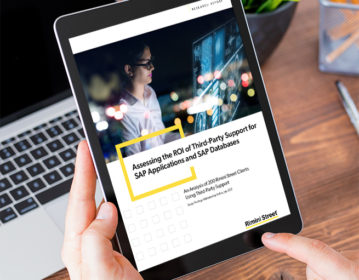
Assessing the ROI of Third-Party Support for SAP Applications and SAP Databases
As SAP annual maintenance fees rise, the value that licensees gain from the original vendor support model is decreasing. To balance the equation, many SAP licensees are moving from vendor software support to third-party support for SAP. In this comprehensive ROI analysis of 200 Rimini Street clients, you’ll learn about real business outcomes from making the switch as reported by clients and supported by hard data. The data has been reviewed and verified by two independent analyst firms. This report, prepared by Valoir Research, validates the significant savings SAP licensees can experience in the following areas: SAP annual maintenance fees: Break/fix support and tax, legal and regulatory updates Upgrade burdens: The cost and labor of forced upgrades just to stay fully supported when vendor mainstream support windows end Customization support gaps: The cost of supporting customizations that break and are not covered under the standard vendor support model Self-support costs: The cost of additional resources and headcount required to deal with inefficiencies of vendor support, including regression testing, evaluation of hundreds of fixes, issue justification and self-service support Download your complimentary copy of the report for takeaways and insights to help you build a business case for SAP third-party support.
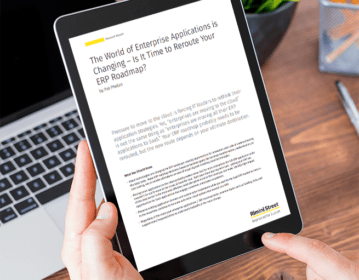
World of Enterprise Applications is Changing Reroute Your ERP Roadmap
Many leaders in the IT space are ‘switching to the cloud’ for their ERP applications suite. As a result of this changing ecosystem, many professionals are trying to strategize their move to streamline the process. If you are evaluating ERP in the cloud, there are three important factors to consider: Identify cloud models that have made the greatest impact to your business, which ones are ready now, and which models offer you greatest control over your roadmap. Analyze the open, vendor-agnostic versus proprietary cloud debate. This becomes particularly critical as ERP vendors abandon their premises-based roadmaps. Review use cases associated with an ERP rip-and-replace (including solution readiness, resourcing, funding, customizations). Pat Phelan, former Gartner analyst and now the head of market research and strategy at Rimini Street, will share lessons learned and insights gained from over 25 years of working with IT leaders on how to move ERP into the cloud era without breaking the bank or introducing unmanageable risk. Download our research report to help with your transition to the cloud today.
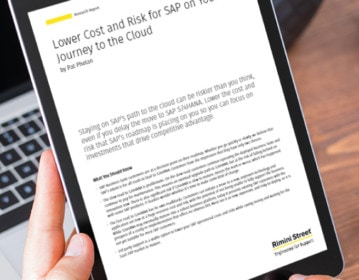
Lower Cost and Risk for SAP on Your Journey to the Cloud
Staying on SAP’s path to the cloud can be riskier than you think, even if you delay the move to SAP S/4HANA. The slow road to S/4HANA is problematic. On the slow road, customers continue operating the deployed Business Suite and continue to pay for maintenance. This ensures an eventual upgrade path to S/4HANA, but at the risk of falling behind on innovation now. There is also significant risk if S/4HANA is slow to mature or misses the mark – or worse – which has happened with some SAP products. IT leaders wonder whether it’s time to make some kind of change. The fast road to S/4HANA has its own roadblocks. Customers can initiate a move to a new, unproven technology and application set now at a huge resource cost and risk, with the potential of being unable to fully support the business. While S/4HANA may eventually mature into a robust business platform, today it presents existing SAP customers with the prospect of a costly reimplementation that offers no obvious ROI. Most see it as new, expensive and risky to deploy. Draw Your Own Roadmap In reality, those are not the only choices. With third-party support from Rimini Street, you can cut the cost of ongoing support for SAP, reinvest the savings and avoid a forced migration to S/4HANA. Or you can use what you save with cost-effective, high-quality support to offset the expense of beginning the reimplementation of your ERP on S/4HANA – but at your own pace. In this research report, Rimini Street VP of Market Research Pat Phelan explains how to lower the cost and risk posed by SAP’s roadmap so you can focus on investments that drive competitive advantage.

Why Enterprises Are Rethinking Their Oracle Relationship and Cloud Strategy
Many IT teams are in the midst of evaluating their enterprise software roadmaps, particularly as vendors like Oracle shift more of their innovation focus away from the core systems that organizations have spent years customizing and building their business around. When designing their long-range IT roadmaps, these IT teams must consider three key factors: the total cost of maintaining their current systems their ability to extend the lifespan of existing enterprise applications while they plan their next move and the intersection point when future enterprise software and infrastructure will be viable – and valuable – to deploy To understand how IT teams are evaluating their options, Rimini Street conducted the 2019 Oracle Application Survey. More than 200 IT leaders and practitioners provided feedback about their relationship with Oracle, their satisfaction with the support, spend and impact Oracle provides, and their plans for the future.
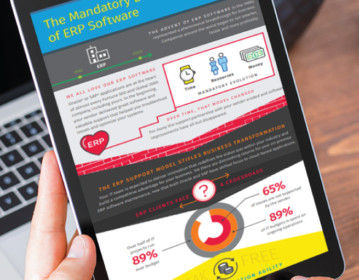
The Mandatory Evolution of ERP Software
The ERP support model stifles business transformation. Your IT team is expected to deliver innovation that redefines the status quo within your industry and build a competitive advantage for your business. Yet there are diminishing returns for your on-premises ERP software maintenance, now that both Oracle and SAP have shifted focus to cloud-based applications. ERP licensees are at a crossroads. Learn how you can break free into the age of innovation agility.


